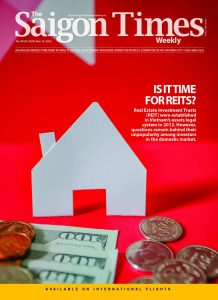Non-core investment is never easy, especially in stocks. If one is not prudent enough to take profit and pull out of the market before it slumps, individual and institutional investors with a powerful analytical team can taste the bitter fruits.
The blow
As per the financial statement of SAM Holdings Corporation (known as SAM on the HOSE), the financial expenses it had to cover in the third quarter of 2022 totaled VND59.3 billion, five times greater than in the same period last year. The loss due to liquidating its investments, in particular, amounted to VND47.6 billion, making up over 80% of the total financial expenses. As of September 30, SAM was still holding more than VND311 billion worth of securities, mostly HPG (over VND91 billion), SJS (VND62 billion), DNP (VND56 billion), TCB and SSI (more than VND20 billion each), etc. In addition, its capital contributions to other entities were valued at some VND2.29 trillion, a rise of VND711 billion against the beginning of the year. Over VND55.5 billion worth of provisions was made for its investments.
With the stock market going downhill in the second and third quarters of this year, the portfolios of those businesses active on the stock market have been badly hit. Apart from SAM, companies with handsome profits from financial investments in the past two years have suffered a heavy blow as they have to make costly provisions or cut losses and pull back their operating profits in general.
Citing LICOGI 14 Joint Stock Company (L14) as an example, this enterprise once captured much attention when its stock price hit VND420,000 per share early this year. In 2021, thanks to its financial investments, L14 reported a “colossal” profit that made a giant leap of 16 times year-on-year. That was mainly attributed to a huge gain of VND238 billion from the investment in CEO (the stock of C.E.O Group Joint Stock Company) and VND90 billion from DIG (Development Investment Construction Joint Stock Corporation).
This year, however, when the stocks of both CEO and DIG have lost more than 80% of their value since the beginning of the year, L14 is now making provisions worth nearly VND69 billion for the devaluation of their investments, resulting in a nine-month after-tax loss of VND15.6 billion, versus a profit of over VND39 billion in the year-ago period. It is noteworthy that the stock price of L14 is only around VND36,000 per share at present, a decline of more than 90% from its peak.
The Danang Housing Investment Development Joint Stock Company (HNX: NDN), as of September 30, owned a portfolio of stocks with an original value of nearly VND400 billion, but on paper, it incurred a loss of VND123 billion, equivalent to 30%. The portfolio of NDN consists of nine stocks, of which SHB, VHM and TCB are currently losing the most, VND53 billion (-41%), VND45 billion (-24%) and VND16 billion (-41%), respectively.
Compared to the end of the second quarter, this business has sustained an additional loss of more than VND33 billion from its investment activities, resulting in a loss after tax of over VND28.7 billion, following the heaviest loss ever (VND114 billion) it recorded in the second quarter of this year. Even so, regardless of the ailing market, NDN, in the third quarter, “mildly” bottom-picked HPG and bought more GEG, while cutting losses from TCB.
Similarly, on paper, Tien Len Steel Corporation (HOSE: TLH) has run into a loss of 57% from VIX, 47% from SHB and IJC, while other stocks are down 39%. Specifically, at the end of the third quarter, this company held a portfolio of stocks whose original price was more than VND138 billion, but has now made a provision worth nearly VND61 billion for price reductions, equivalent to a fall of 44%. Such provision was nearly VND5 billion smaller than in the second quarter, not due to increased stock prices but because TLH had cut some losses with other stocks.
Even giants like Vinh Hoan Corporation (HOSE: VHC) cannot escape the widespread tragedy when engaged in securities investment. As per its Q3 financial statement, VHC invested more than VND190 billion in stocks at their original prices. However, the fair value is now only over VND112 billion, and VHC has to make a provision worth nearly VND79 billion, nearly half of the original investment value. Specifically, more than VND31 billion was set aside as a provision for the stock NLG of Nam Long Investment Corporation. DXS of Dat Xanh Services and KBC caused Vinh Hoan a loss of nearly VND24.6 billion and more than VND6 billion, respectively. Compared to the end of the second quarter, VHC spent the most as extra provisions for NLG and DXS, adding VND7.5 billion and VND7.3 billion in three months, respectively.
The pain of abandoning one’s core operations
The above examples are the clearest evidence of how severely the weakening stock market has affected the activities of enterprises, not only making it hard for them to raise capital but also leading to heavy losses.
Non-core investment is never easy, especially in stocks. If one is not prudent enough to take profit and pull out of the market before it slumps, individual and institutional investors with a powerful analytical team can taste the bitter fruits.
When the economy was haunted by Covid-19 (2020-2021), many companies were left with a tidy sum of idle money that could not be spent on production and business expansion, prompting them to look for opportunities in the stock market. As a result, quite a few enterprises reaped handsome profits thanks to the massive cash flow into the market then.
However, as the pandemic has gradually been brought under control and the economy is getting back on its feet, some companies have timely exited the market and directed their capital back to production and business activities, while a number of enterprises are still “engrossed” in investments and even stuck with a host of those stocks which were bought when their prices peaked.
The fact that a lot of corporate investors have withdrawn their money from the stock market to return to their core operations has been one of the factors negatively impacting the market, dragging it into a period of correction from the beginning of April until now.
The VN-Index dropped by nearly 20% in the second quarter of 2022, some 5.5% in the third quarter, and more than 9% in October. Thus, the holdings of many corporate investors must have caused them extra losses last month. During recent sessions, when the market experienced drastic reductions, quite a few stocks became the subject of forced selling, leading to the possibility of not only leaders and internal stakeholders but enterprises also facing forced liquidation of their investments.

In this situation, the aforementioned enterprises are stuck in a dilemma: either to keep their portfolios intact—making additional provisions, bearing losses in the process until the challenging period is over, and waiting for the day when the market is fully recovered to stage their exit—or to instantly cut losses to make their financial situation less pessimistic and avoid the need to draw on extra resources for provisions. All choices are tough, require thorough consideration and depend on their ability to evaluate how the stock market will develop in the coming time.
Remarkably, in the context of interest rates rapidly rising, which not only leaves a negative impact on investment channels, but also exerts pressure on those firms burdened with debts as interest expenses will sharply go up, the companies that have previously issued their bonds are even wrestling with the urgency to buy them back prematurely. This situation will likely leave certain businesses with no choice but to cut down on their financial investments and realize losses on paper to ensure the availability of cash for their business and payment objectives, especially now that the end of the year is around the corner.











